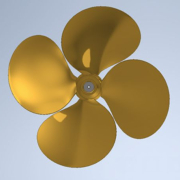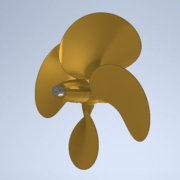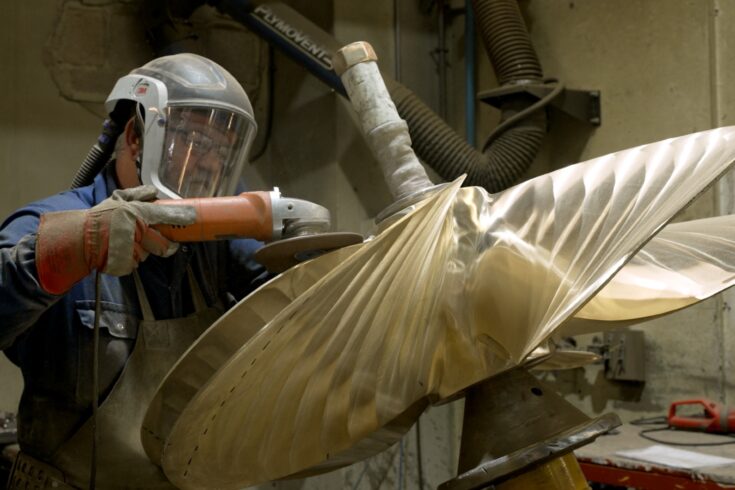Innovative new controllable pitch propeller offers an affordable solution to reducing greenhouse gas emissions in marine transport.
Marine transport is a highly efficient way to move goods and people around the world, with more than 70% of global trade currently transported by sea.
Yet achieving decarbonisation in the marine sector remains a complex challenge.

A controllable pitch propeller, front view. Credit: Teignbridge Propellers
A novel solution
Teignbridge Propellers is a Devon-based marine design and manufacturing company.
They have come up with a novel solution to improve energy efficiency and reduce the greenhouse gas emissions that are associated with traditional fuels such as fuel oil.
The company’s new controllable pitch propeller has been designed to improve efficiency by matching a vessel’s performance to its duty cycle.

A controllable pitch propeller, side view. Credit: Teignbridge Propellers
Using fuel economically
This enables the vessel to use fuel as economically as possible for any given set of parameters.
It does this in the same way that using an automatic gear box in a car will ensure that the vehicle can reach peak efficiency.
The company will be able to move from initial prototype development to demonstration sea trials after taking part in a new government funding scheme.
Clean Maritime Demonstration competition (CMDC)
The high-efficiency controllable pitch propeller project is part of the CMDC, funded by the Department for Transport and delivered in partnership with Innovate UK.
The CMDC was announced in March 2021.
It is part of the Prime Minister’s 10-point plan to position the UK at the forefront of green shipbuilding and maritime technology.
The competition is a £23 million investment from government alongside a further c.£10 million from industry to reduce emissions from the maritime sector.
55 projects across the UK
The programme is supporting 55 projects across the UK, including projects in:
- Scotland
- Northern Ireland
- the south-west to the north-east of England.
As set out in the Clean Maritime Plan (2019), government funding has been used to support early-stage research relating to clean maritime.
Research, design and development
The programme will be used to support the research, design and development of zero emission technology and infrastructure solutions for maritime and to accelerate decarbonisation in the sector.
David Duncan, Teignbridge Propellers’ Group Chair and co-founder, said:
Being awarded this funding has made a huge difference to how quickly we can move from prototype to demonstration, so that’s really exciting for the company.
We already export over 80% of our products so this funding has given us a real opportunity to access a huge new global market.
That’s good for the company, good for the local economy and good for the country.
Watch our video to find out more about how Teignbridge Propellers is developing an innovative new controllable pitch propeller that offers an affordable solution to reducing greenhouse gas emissions in marine transport.
Last updated: 23 February 2023

